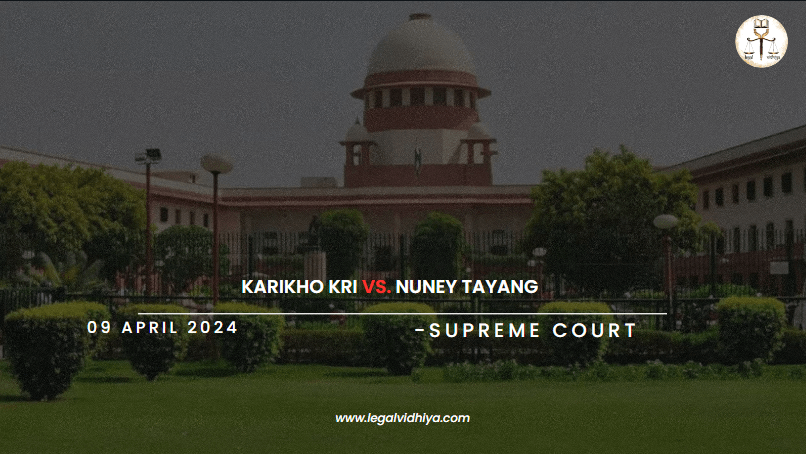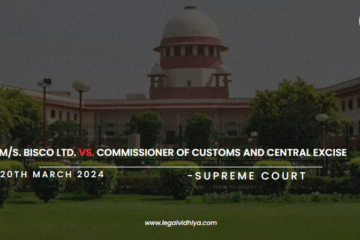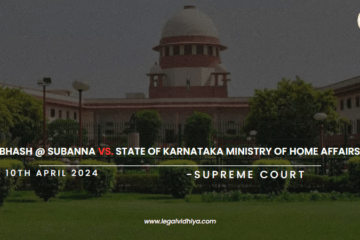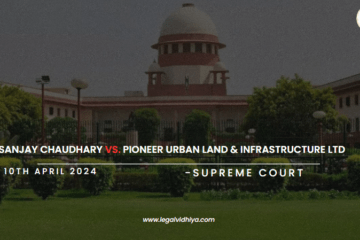
| CITATION | [2024] 4 S.C.R. 394 |
|---|---|
| DATE OF JUDGMENT | 09 April 2024 |
| COURT | Supreme Court of India |
| APPELLANT | Karikho Kri |
| RESPONDENT | Nuney Tayang And Another |
| BENCH | Hon’ble Mr. Justice Sanjay Kumar |
INTRODUCTION
The case of Karikho Kri vs Nuney Tayang centers around an election petition where Nuney Tayang contested the acceptance of Karikho Kri’s nomination for the 44-Tezu(ST) Assembly Constituency, raising issues of non-disclosure of assets and liabilities. The High Court found discrepancies in Karikho Kri’s nomination papers, specifically noting that three vehicles registered under his family members were transferred before the nomination, indicating non-ownership at the time of filing. These findings led to a challenge regarding the improper acceptance of Karikho Kri’s nomination and raised concerns about the potential impact of these non-disclosures on the election outcome. The case involved critical legal provisions such as Section 123(2) and Section 100(1)(d)(i) of the Representation of the People Act, 1951, which address corrupt practices and grounds for declaring an election void, respectively. After analyzing the contentions and legal interpretations, the court ultimately concluded that the non-disclosures did not constitute substantial defects, thereby upholding Karikho Kri’s election.
FACTS OF THE CASE
- The case revolves around an election petition where Nuney Tayang contested the acceptance of Karikho Kri’s nomination for the 44-Tezu(ST) Assembly Constituency in Arunachal Pradesh.
- The elections were held on 11.04.2019, where Karikho Kri emerged as the winner with 7538 votes.
- Nuney Tayang from the Indian National Congress, who received 1088 votes, filed a petition challenging the elections and Karikho Kri’s election victory.
- The challenge was based on Karikho Kri’s non-disclosure of certain materials, including dues for electricity charges and assets belonging to his wife and sons.
- The High Court scrutinized the nomination papers and found discrepancies related to the non-disclosure of assets and liabilities.
- Specifically, it was noted that three vehicles registered under Karikho Kri’s family members were transferred before the nomination, indicating a lack of ownership at the time of filing.
- These findings led to a challenge regarding the improper acceptance of Karikho Kri’s nomination and raised questions about the impact of these non-disclosures on the election outcome.
- The High Court declared Karikho Kri’s election void according to various sections of the Representation of the People Act, 1951.
- Nuney Tayang pleaded with the High Court to be declared the duly elected candidate after Karikho was disqualified, but his plea was rejected due to a lack of substantial evidence to prove how he could match the votes of Dr. Mohesh Chai, who had the second-highest number of votes.
- Troubled by the decision of the High Court, Karikho Kri filed a civil appeal in the Supreme Court, while Nuney Tayang filed a cross-appeal.
ISSUES RAISED
- Whether the non-disclosure of certain assets and liabilities by Karikho Kri in his nomination papers constitute a substantial defect under the Representation of the People Act, 1951?
- Was the transfer of three vehicles registered under Karikho Kri’s family members before the nomination sufficient grounds to invalidate his nomination?
- Did the improper acceptance of Karikho Kri’s nomination papers materially affect the outcome of the election?
- Should the non-disclosure of taxes by Karikho Kri be considered a corrupt practice under Section 123(2) of the Representation of the People Act, 1951?
CONTENTIONS OF APPELLANT
- Karikho Kri argued that the High Court’s decision declaring the election void was invalid based on the sections of the Representation of the People Act referenced.
- He contended that the non-disclosure of assets, including vehicle ownership and movable and immovable assets, did not constitute a substantial defect warranting the invalidation of the election.
- Karikho asserted that he had submitted a ‘No Dues Certificate’ for electricity bills after vacating government property, clearing all dues, and thus had no outstanding obligations.
- He admitted to disclosing property dues and taxes in one segment of the affidavit (Form 26) but argued that the omission in another part was not significant enough to impact the election. Karikho contended that the allegations were based on non-disclosure of assets owned by his wife and sons, which he deemed immaterial to the election process.
- He challenged the High Court’s interpretation that failure to disclose these documents constituted corrupt practices under Section 123(2) of the Representation of the People Act. He emphasized that candidates should not be legally bound to disclose every asset, as it could infringe on their right to privacy.
- Karikho argued that the alleged non-disclosures did not materially affect the election results and thus, his nomination should not be invalidated.
CONTENTIONS OF REPONDENT
- Nuney Tayang argued that Karikho Kri failed to disclose essential properties in his affidavit (Form 26), violating Election Rules, 1961.
- He claimed that the non-disclosure of three out of four vehicles, registered under Karikho’s wife and sons, was critical to the case.
- – Nuney pointed out that Karikho neglected to submit the ‘No Dues Certificate’ for electricity bills, raising doubts about his financial integrity. Additionally, he noted inconsistencies in Karikho’s disclosure of property liabilities and taxes in the affidavit, indicating a lack of transparency.
- Nuney contended that Karikho’s failure to disclose movable and immovable assets amounted to corrupt practices under Section 123(2) of the Representation of the People Act.
- He argued that the non-disclosures constituted a significant defect, justifying the invalidation of the election.
- Nuney asserted that these non-disclosures materially affected the election results, providing grounds for voiding Karikho Kri’s nomination. Furthermore, he emphasized the importance of transparency and full disclosure in election processes to uphold fairness and integrity.
JUDGEMENT
Upon thorough reconsideration of the pertinent sections of the Representation of the People Act, 1951, and the Election Rules, 1961, the Supreme Court reversed the High Court’s ruling, emphasizing that minor discrepancies such as the non-disclosure of asset ownership or the omission of a dues certificate should not automatically invalidate an election victory. Recognizing voters’ right to candidate information, the Court underscored that candidates are not obligated to disclose every asset they possess to protect their privacy rights. The Court stipulated that elections can only be deemed void under the specified sections of the law if the non-disclosure of assets significantly impacts the election outcome, which was not substantiated in this instance. Consequently, the Supreme Court concluded that there was insufficient evidence to warrant the invalidation of Karikho Kri’s election or nomination. Therefore, the civil appeal filed by Karikho Kri was upheld, while Nuney Tayang’s appeal was dismissed. The Court duly notified the Election Commission and the Chairman of the Legislative Assembly of Arunachal Pradesh of its decision.
This judgment reflects a nuanced understanding of electoral law, balancing the imperative of transparency with candidates’ privacy rights. It underscores the principle that election results should only be nullified if the non-disclosure of assets materially affects the outcome, ensuring the integrity of the electoral process. By allowing Karikho Kri’s appeal, the Supreme Court upholds the democratic principles of fair and evidence-based adjudication while dismissing Nuney Tayang’s appeal, reaffirming the importance of substantive proof in electoral disputes. The Court’s communication to relevant authorities ensures transparency and adherence to legal procedures in the aftermath of its decision.
ANALYSIS
In the case of Karikho Kri vs. Nuney Tayang, the Supreme Court conducted a detailed analysis of the allegations surrounding Karikho Kri’s election victory. The court scrutinized the legal provisions of the Representation of the People Act, 1951, and the Election Rules, 1961, in light of the arguments presented by both parties. It emphasized the need for transparency in electoral processes while also considering candidates’ rights to privacy. The judgment overturned the High Court’s decision, stating that minor discrepancies in asset disclosure should not invalidate an election unless they significantly impact the outcome. By upholding Karikho Kri’s nomination, the Supreme Court underscored the importance of preserving the democratic integrity of elections.
This verdict sets a crucial precedent, highlighting the meticulous scrutiny required in electoral proceedings. It reinforces the principle that elections should be decided based on substantial evidence and that minor discrepancies should not undermine the electoral process’s fairness. The judgment serves to balance transparency with candidates’ rights, ensuring that electoral outcomes are determined fairly and in accordance with the law, thereby upholding the democratic principles of the Indian electoral system.
CONCLUSION
The case of Karikho Kri vs. Nuney Tayang represents a significant milestone in Indian electoral jurisprudence, setting a clear precedent for the adjudication of election disputes. Through its meticulous analysis, the Supreme Court reaffirmed the fundamental principles of fairness, transparency, and adherence to legal standards in electoral processes. By overturning the High Court’s decision and upholding Karikho Kri’s nomination, the Court emphasized that minor discrepancies in asset disclosure should not undermine the integrity of election results unless they materially affect the outcome. This verdict underscores the importance of maintaining the democratic essence of elections while also respecting candidates’ rights to privacy and due process.
This judgment serves as a beacon for future electoral disputes, guiding the judiciary in ensuring the sanctity of electoral processes in India. It underscores the significance of evidence-based decision-making, upholding the rule of law, and preserving the democratic principles upon which the Indian electoral system is built. By striking a balance between transparency and privacy rights, the Supreme Court’s ruling in this case reaffirms its commitment to upholding electoral integrity and safeguarding the democratic values enshrined in the Indian Constitution.
REFERENCES
- SCC Online
- https://economictimes.indiatimes.com/news/politics-and-nation/gauhati-high-court-declares-arunachal-mla-karikho-kri-s-election-null-and-void/articleshow/101965966.cms?from=mdr
- https://www.advocatekhoj.com/library/judgments/announcement.php?WID=17475
This Article is written by POORNA.R student of School of excellence in law, Chennai; Intern at Legal Vidhiya.
Disclaimer: The materials provided herein are intended solely for informational purposes. Accessing or using the site or the materials does not establish an attorney-client relationship. The information presented on this site is not to be construed as legal or professional advice, and it should not be relied upon for such purposes or used as a substitute for advice from a licensed attorney in your state. Additionally, the viewpoint presented by the author is of a personal nature.




0 Comments